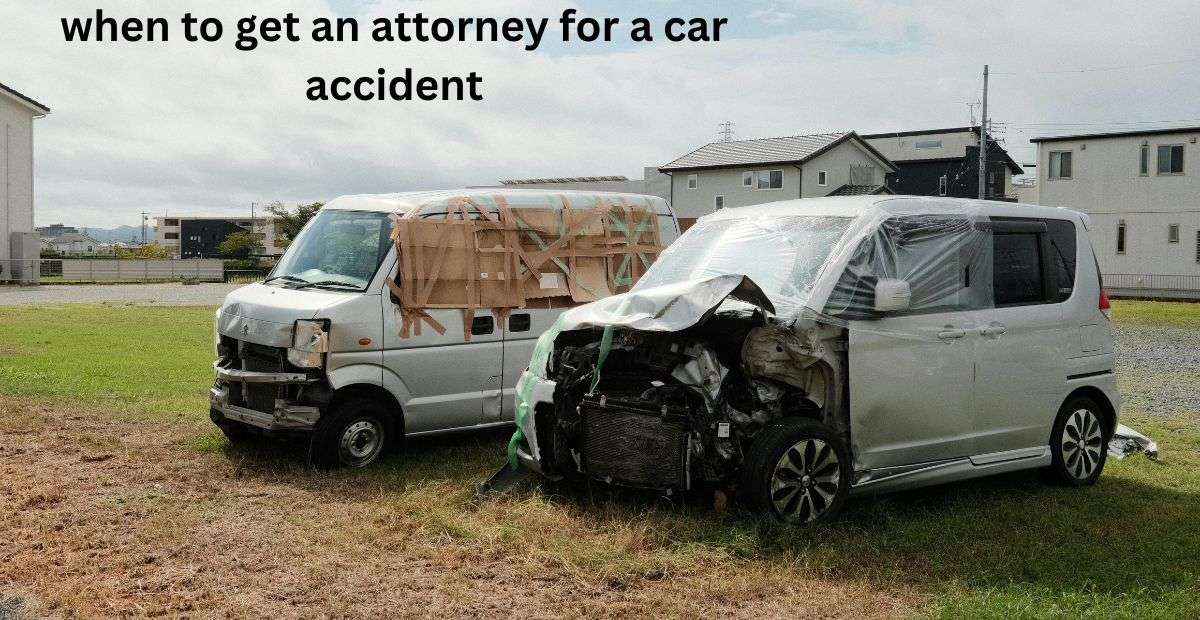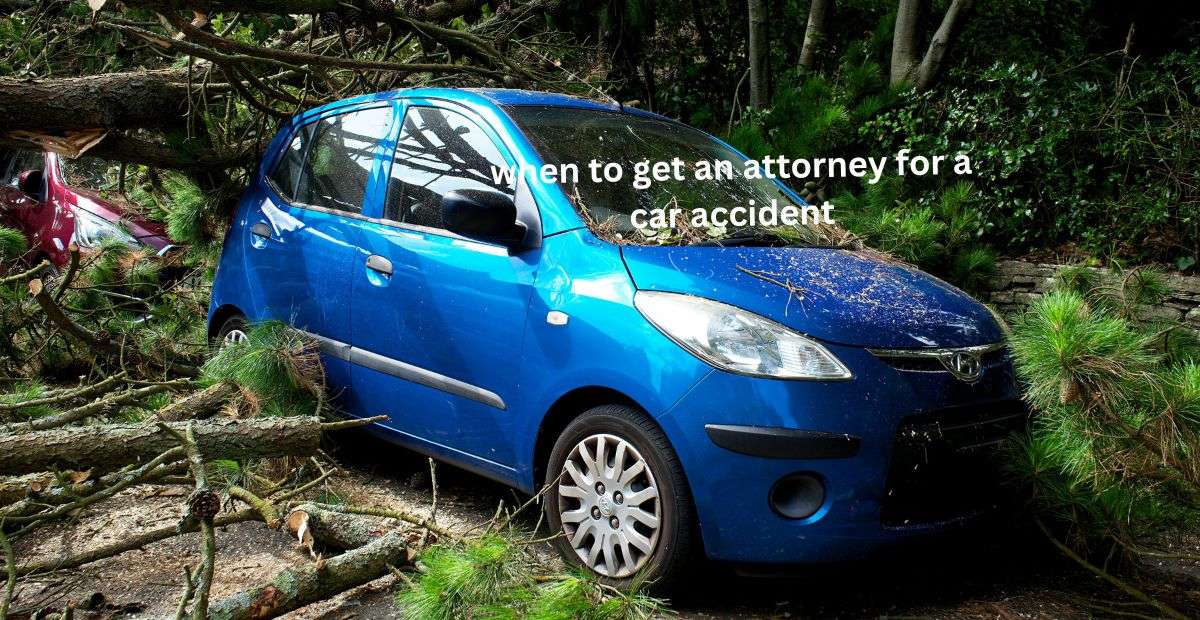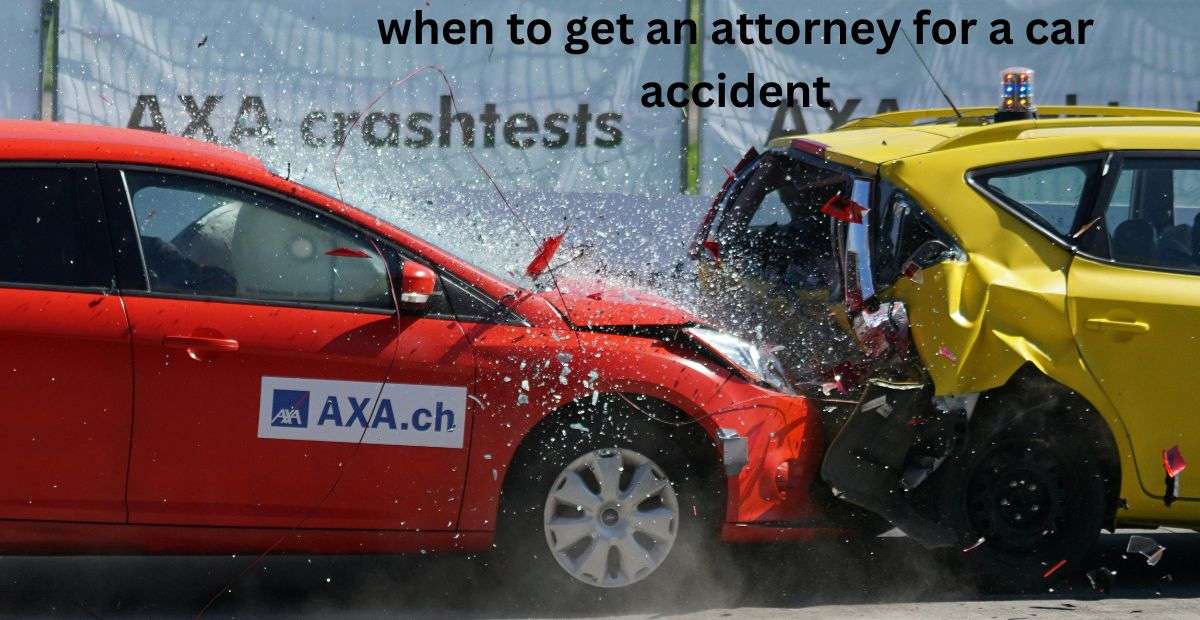Contents
- 1 When To Get An Attorney For A Car Accident
- 1.1 Introduction
- 1.2 Understanding When to Get an Attorney for a Car Accident
- 1.3 Situations That Require Legal Assistance
- 1.4 The Role of an Attorney in Car Accident Cases
- 1.5 How to Identify the Right Time to Contact an Attorney
- 1.6 Common Misconceptions About Hiring an Attorney
- 1.7 Benefits of Hiring an Attorney Early
- 1.8 Finding the Right Attorney for Your Case
- 1.9 Steps to Take After a Car Accident
- 1.10 Frequently Asked Questions
- 1.10.1 When Should I Contact an Attorney?
- 1.10.2 Can I Handle the Case Myself?
- 1.10.3 When not to claim car insurance?
- 1.10.4 Which car is most involved in accidents?
- 1.10.5 Which vehicle causes more accidents?
- 1.10.6 Who is at highest risk for vehicular accidents?
- 1.10.7 1. Young Drivers (16-24 years old)
- 1.10.8 2. Older Drivers (65+ years old)
- 1.10.9 3. Teenage Drivers (16-19 years old)
- 1.10.10 4. Drivers Under the Influence of Alcohol or Drugs
- 1.10.11 5. Distracted Drivers
- 1.10.12 6. Male Drivers
- 1.10.13 7. Nighttime Drivers
- 1.10.14 8. Rural Area Drivers
- 1.10.15 9. Drivers Who Speed
- 1.10.16 10. Drivers with Poor Health or Fatigue
- 1.10.17 11. Commercial Drivers (e.g., Truck Drivers)
- 1.10.18 12. Motorcyclists
When To Get An Attorney For A Car Accident
When to get an attorney for a car accident is a crucial question many accident victims face. Knowing the right time to seek legal help can make a significant difference in your case outcome. While minor accidents may not always require legal representation, complex cases involving severe injuries, insurance disputes, or significant financial losses do. An attorney ensures your rights are protected and helps you navigate through confusing legal processes. Whether it’s negotiating with insurance companies or gathering evidence, hiring an attorney early can maximize your compensation and safeguard your interests.

Table of Contents
- Introduction
- Understanding When to Get an Attorney for a Car Accident
- Situations That Require Legal Assistance
- Minor Accidents vs. Major Accidents
- Insurance Disputes
- Injuries and Medical Expenses
- The Role of an Attorney in Car Accident Cases
- Navigating Complex Legal Processes
- Negotiating with Insurance Companies
- How to Identify the Right Time to Contact an Attorney
- Immediately After the Accident
- When Facing Financial Challenges
- Common Misconceptions About Hiring an Attorney
- Is Hiring an Attorney Expensive?
- Do You Always Need Legal Help?
- Benefits of Hiring an Attorney Early
- Protecting Your Rights
- Maximizing Compensation
- Finding the Right Attorney for Your Case
- Qualities to Look For
- Research and Referrals
- Steps to Take After a Car Accident
- Gathering Evidence
- Contacting Relevant Parties
- Frequently Asked Questions
- When Should I Contact an Attorney?
- Can I Handle the Case Myself?
- Conclusion
Introduction
Car accidents can be overwhelming and confusing. Knowing when to get an attorney for a car accident can help you navigate these challenging situations. This guide will provide detailed insights into legal assistance after an accident and ensure your rights are protected.
Understanding When to Get an Attorney for a Car Accident
Understanding when it’s appropriate to seek legal assistance can make a significant difference in the outcome of your case. Some situations clearly warrant the help of an attorney, while others may not. This section outlines the scenarios where legal representation is essential and where it might not be necessary.
Situations That Require Legal Assistance
Minor Accidents vs. Major Accidents
Not all accidents require legal help. For minor accidents with no injuries or disputes, you may handle the process independently. However, major accidents often involve extensive damages, injuries, and complex claims that require legal expertise to navigate. An attorney can ensure your rights are protected in these situations.
Insurance Disputes
If your insurance company denies your claim or offers inadequate compensation, hiring an attorney ensures you get what you deserve. Attorneys have the skills to handle disputes effectively, including gathering evidence, interpreting policy details, and presenting a strong case to secure a fair settlement.
Injuries and Medical Expenses
Severe injuries can lead to extensive medical bills. An attorney can help secure the compensation needed to cover these expenses and protect you from financial stress. They work to include medical costs, rehabilitation, and even future medical expenses in your claim.
The Role of an Attorney in Car Accident Cases
Legal procedures can be confusing and overwhelming for individuals without legal experience. Attorneys are skilled in filing claims, managing deadlines, and handling court requirements to ensure your case proceeds smoothly. They simplify the process, saving you time and stress.
Negotiating with Insurance Companies
Insurance companies often aim to minimize payouts. An attorney will negotiate on your behalf, countering lowball offers and using evidence to demand fair compensation. They have experience in understanding insurance tactics and how to combat them effectively.
How to Identify the Right Time to Contact an Attorney
Immediately After the Accident
Contacting an attorney right after an accident ensures evidence is preserved, and your rights are protected. Early legal advice can prevent costly mistakes and help you avoid being taken advantage of by insurance companies.
When Facing Financial Challenges
If medical bills, repair costs, or lost wages become overwhelming, an attorney can help you seek adequate compensation to ease the burden. They ensure you receive the funds needed to recover physically, emotionally, and financially.
Common Misconceptions About Hiring an Attorney
Is Hiring an Attorney Expensive?
Many believe attorneys are costly. However, most work on a contingency basis, meaning you pay only if they win your case. This structure makes legal help accessible to those who might otherwise avoid it due to financial concerns.
Do You Always Need Legal Help?
Not every case requires an attorney. Minor accidents or clear-cut situations may not need legal assistance. However, complex cases involving injuries, disputes, or significant damages benefit greatly from professional expertise.
Benefits of Hiring an Attorney Early
Protecting Your Rights
An attorney ensures your rights are upheld and prevents others from taking advantage of you. They handle communication with insurance companies, opposing parties, and other stakeholders to ensure fair treatment.
Maximizing Compensation
Legal experts know how to build a strong case, increasing your chances of receiving full compensation. They understand the value of your claim and work to include all relevant damages, from medical expenses to pain and suffering.
Finding the Right Attorney for Your Case
Qualities to Look For
Choose an attorney with experience in car accident cases, strong communication skills, and a proven track record of success. Look for someone who is approachable and willing to answer your questions.
Research and Referrals
Ask for referrals from friends or family, and research online reviews to find the best legal representation. Check for credentials, certifications, and past client testimonials to ensure you choose a trustworthy attorney.
Steps to Take After a Car Accident
Gathering Evidence
Collect photos of the accident scene, witness statements, and police reports immediately after the accident. These are crucial for building your case and establishing fault. Ensure you document injuries, property damage, and other relevant details.
Contacting Relevant Parties
Notify your insurance company and consult an attorney to guide you through the next steps. Avoid providing detailed statements to insurers without legal advice, as this can impact your claim.

when to get an attorney for a car accident
Frequently Asked Questions
When Should I Contact an Attorney?
Contact an attorney if you face injuries, disputes, or significant financial losses after an accident. Early consultation ensures your case is handled properly from the start.
Can I Handle the Case Myself?
You can manage minor cases on your own if there are no injuries or disputes. For complex claims, professional help ensures better outcomes and a smoother process.
When not to claim car insurance?
Knowing when not to claim car insurance is important to avoid unnecessary premium hikes or policy cancellations. Here are some situations where it may be better not to file a claim:
- Minor Accidents:
- If the damage is small, like a scratch or dent, and can be repaired at a low cost, paying out-of-pocket may be cheaper than filing a claim.
- No-Claim Bonus:
- Many policies offer a no-claim bonus (NCB), which can significantly reduce premiums in the future. If you file a claim, you may lose this discount.
- High Deductible:
- If the cost of repairs is close to or less than your deductible, it’s better not to file a claim as the insurer won’t pay out, but you’ll still risk losing your no-claim bonus.
- Fault is Not Clear:
- If it’s difficult to prove who was at fault in an accident, filing a claim could lead to complications and potential increased premiums.
- Non-Collision Damage:
- For issues like vandalism or natural disasters, if the damage is minimal and repairs can be handled affordably, a claim might not be worth the increase in future premiums.
- Frequent Claims:
- If you’ve already filed multiple claims in a short period, it could signal to the insurer that you’re a high-risk policyholder, leading to premium hikes or non-renewal.
- Small Liability Claims:
- If you can settle a liability issue directly with the other party, it might be more cost-effective than involving the insurance company.
In these cases, it may be more cost-effective to avoid making a claim, keeping your premiums low and maintaining your policy benefits.
Which car is most involved in accidents?
The car models most involved in accidents can vary by region, but generally, vehicles with high sales volumes, older models, and certain types of vehicles are more frequently involved in accidents. Some factors contributing to these include driver behavior, vehicle size, and safety features. Here are some car types often associated with higher accident rates:
- Toyota Camry:
- Due to its popularity, the Toyota Camry is often cited in accident statistics. It’s one of the most sold sedans, and with that comes more involvement in accidents.
- Honda Civic:
- Another popular vehicle, the Honda Civic is frequently involved in accidents. Its widespread use among younger drivers contributes to its accident rates.
- Ford F-150:
- Pickup trucks, especially the Ford F-150, are often involved in accidents. Larger vehicles like trucks are involved in more crashes due to their size and weight.
- Chevrolet Silverado:
- Similar to the Ford F-150, the Chevrolet Silverado has a high involvement in accidents due to its popularity in the truck market.
- Nissan Altima:
- The Nissan Altima is frequently seen in accident reports, often due to its widespread use as a commuter vehicle.
- Hyundai Elantra:
- The Hyundai Elantra is a compact car with high sales figures, leading to a higher involvement in accidents compared to less common vehicles.
- Jeep Cherokee:
- SUVs like the Jeep Cherokee are involved in a significant number of accidents, partly because of their higher rollover risks and popularity for off-road driving.
- Subaru Outback:
- As a popular vehicle in areas with poor weather conditions, Subaru Outbacks are often involved in accidents, particularly during adverse weather events.
Key Factors Contributing to Accidents:
- High sales volume: More cars on the road mean more chances for accidents.
- Driver behavior: Certain cars attract younger, less experienced drivers, who may be more prone to accidents.
- Vehicle type: Larger vehicles or those with poorer safety ratings can be involved in more severe accidents.
It’s important to note that involvement in accidents doesn’t necessarily correlate with the car’s safety features or crashworthiness. Cars with higher accident involvement often reflect their higher on-road presence.
Which vehicle causes more accidents?
The vehicles most frequently involved in accidents are typically those with high sales volumes, larger vehicle types, and certain driver demographics. Based on accident statistics, here are some of the vehicles and types most often involved in crashes:
- Chevrolet Silverado:
- With high sales numbers, the Chevrolet Silverado is often involved in accidents, particularly in fatal crashes. Between 2016 and 2020, it was one of the most frequently involved vehicles in fatal accidents.
- Ford F-150:
- The Ford F-150, another popular vehicle in the U.S., is frequently seen in accident statistics. Its high sales volume contributes to its high involvement in accidents.
- Honda Accord:
- The Honda Accord is one of the most accident-prone vehicles, partly due to its popularity. It consistently ranks high in accident involvement, with a high number of crashes per 100,000 vehicles sold.
- Toyota Camry:
- The Toyota Camry, a best-selling sedan, is another car often involved in accidents due to its widespread use.
- Dodge Ram:
- Similar to the Ford F-150, the Dodge Ram pickup truck also sees a high number of accidents, especially fatal ones, due to its sales volume and popularity.
Vehicle Types That Cause More Accidents:
- Pickup Trucks (e.g., Chevrolet Silverado, Ford F-150): Larger vehicles like pickup trucks are involved in more accidents due to their size and weight.
- SUVs: SUVs are more prone to rollovers, contributing to a higher risk of accidents.
While these vehicles are often involved in accidents, it’s essential to remember that this is influenced by their sales volume and not necessarily their safety features.
Who is at highest risk for vehicular accidents?
Several groups of people are at a higher risk for being involved in vehicular accidents due to factors such as age, driving behavior, and lifestyle. Here’s a breakdown of the groups at highest risk:
1. Young Drivers (16-24 years old)
- Risk Factors: Inexperience, risk-taking behavior, and distraction (e.g., texting while driving).
- Statistics: This age group consistently shows the highest crash involvement rates, especially for fatal accidents.
2. Older Drivers (65+ years old)
- Risk Factors: Age-related decline in vision, reflexes, and cognitive abilities, making it harder to react quickly in critical driving situations.
- Statistics: Older drivers are more likely to be involved in accidents where they are injured, though they are generally less likely to cause accidents.
3. Teenage Drivers (16-19 years old)
- Risk Factors: Inexperience, poor decision-making, high rates of distracted driving, and high likelihood of driving under the influence of alcohol or drugs.
- Statistics: Teen drivers are at particularly high risk during their first few years of driving.
4. Drivers Under the Influence of Alcohol or Drugs
- Risk Factors: Impaired judgment, slower reaction times, and poor decision-making.
- Statistics: Driving under the influence (DUI) is a significant cause of accidents, with alcohol being the most common substance involved.
5. Distracted Drivers
- Risk Factors: Use of smartphones, eating, or interacting with in-car technology.
- Statistics: Distracted driving has become one of the leading causes of accidents, especially among young and middle-aged adults.
6. Male Drivers
- Risk Factors: Higher likelihood of engaging in risky driving behaviors (speeding, tailgating, aggressive driving).
- Statistics: Men, particularly young men, are statistically more likely to be involved in accidents compared to women.
7. Nighttime Drivers
- Risk Factors: Reduced visibility, increased fatigue, and a higher likelihood of impaired driving.
- Statistics: Accidents are more frequent during nighttime hours, especially between midnight and 3 a.m., when alcohol-related crashes peak.
8. Rural Area Drivers
- Risk Factors: Higher speeds, fewer traffic lights, and limited law enforcement in some rural areas.
- Statistics: Rural roads tend to have more severe accidents due to higher speeds and lack of traffic control.
9. Drivers Who Speed
- Risk Factors: Increased likelihood of losing control of the vehicle, reduced reaction time, and more severe crashes.
- Statistics: Speeding is a major contributing factor to accidents, especially on highways and urban roads.
10. Drivers with Poor Health or Fatigue
- Risk Factors: Reduced alertness, slower reflexes, and inability to focus.
- Statistics: Fatigue is a leading cause of crashes, especially for drivers working long hours or driving late at night.
11. Commercial Drivers (e.g., Truck Drivers)
- Risk Factors: Long driving hours, heavy loads, and sometimes fatigue or impaired driving.
- Statistics: Large trucks are often involved in serious accidents, especially on highways, though safety regulations aim to reduce these risks.
12. Motorcyclists
- Risk Factors: Lack of protection, higher speeds, and difficulty being seen by other drivers.
- Statistics: Motorcycles are much more likely to be involved in fatal accidents compared to passenger vehicles.
Key Takeaways:
- Inexperience (young drivers) and age-related decline (older drivers) are significant risk factors.
- Distracted, impaired, or fatigued drivers face the highest risk of accidents.
- Men and young drivers are more prone to risky driving behaviors, resulting in a higher accident rate.
- Motorcyclists face a higher fatality rate per mile driven.
By being aware of these risk factors, both drivers and passengers can take steps to minimize their chances of being involved in an accident.
Conclusion
Knowing when to get an attorney for a car accident is essential for protecting your rights and securing fair compensation. Understanding the right steps and seeking legal assistance when necessary can make all the difference in your case. Don’t hesitate to consult a professional if you’re unsure about handling the aftermath of an accident on your own.


Great beat ! I wish to apprentice whilst you amend your site, how can i subscribe for a weblog site? The account helped me a acceptable deal. I were tiny bit acquainted of this your broadcast offered vibrant clear idea
I have learn several just right stuff here. Definitely value bookmarking for revisiting. I wonder how so much effort you place to create this kind of fantastic informative site.